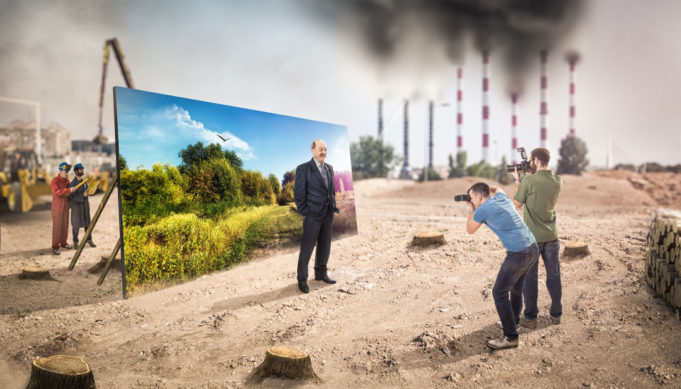Earthworks sent out an email recently saying they oppose all new extraction of oil and gas and any new infrastructure involving future extraction.
That sounds an awful lot like a cease-and-desist order.
“We are in the midst of a climate crisis, and oil-and-gas methane pollution is accelerating that crisis,” writes Lauren Pagel, policy director for the nonprofit devoted to battling the adverse impacts of fossil-fuel energy development.
Oil and gas barons responded by saying, “OK. We’ll stop drilling. Sorry if we caused any problems.”
Just kidding. Pagel said she hadn’t received any response from the energy industry about the article she co-wrote with Earthworks program director Bruce Baizel, even though they came close to calling for a ban on drilling.
“We tend not to use ‘ban’ language,” Pagel said in a phone conversation with us. “There is no scenario where there is a federal ban on oil and gas extraction, and all extraction stops. That is not realistic. We like to think of it as a managed decline of fossil fuels.”
However, Pagel and her cohorts spend so much time trying to strengthen regulations and protect Obama-era methane rules that they thought it important to remind everyone occasionally that regulation isn’t the end game.
“For us, the regulations are something we should be doing while we are hopefully getting on a path in the near future to get away from fossil fuels,” she said.
She pointed to the new climate change report by the Intergovernmental Panel on Climate Change (IPCC) that supports the Paris Agreement efforts to strengthen the global response to climate change. A primary goal is to prevent the global temperature average from increasing more than 1.5 degrees Celsius above pre-industrial levels. The IPCC, established in 1988, seeks to understand climate change while creating global agreements.
Leaving behind fossil fuels completely could be accomplished in a few decades if efforts began in earnest today, she said.
“So much depends on the political will,” she said. “If we had an administration at the federal level and in key states that was committed and looked really hard at what the IPPC has said … we could do it within 30 years. I hope we can. If we can’t, I don’t want to say to our kids that we are leaving them a world that is worse than the world we are in today as far as the climate.”
The statement piggybacks on the Green New Deal, Democratic Congresswoman Alexandria Ocasio-Cortez’ proposal to greatly reduce carbon emissions and create new jobs while transitioning toward complete renewable energy. Those are tough words to propose in a country that pumps more than 10 million barrels of oil a day and is considered the world’s largest producer. Those words cause pain especially in Texas, a state with a century-old love affair with Big Oil. Texas produces more oil than any other state, and two of the country’s top shale plays can be found here –– the Eagle Ford in southern Texas and the Permian Basin in the western part of the state. The Barnett Shale play in North Texas has slowed down but continues producing petroleum products and attracting drillers.
So, pardon us, but we’re skeptical about the Earthworks proclamation and the Green New Deal taking hold. A few states such as New Mexico and Colorado are pushing for tougher regulations, but places such as Texas seem hell-bent on pumping fossil fuels well into the apocalypse.
“Given the politics at the state level, there doesn’t appear to be much interest in real meaningful regulation of the oil and gas industry in Texas,” Pagel said. “The reason I work so hard on federal methane standards is because they are necessary for places like Texas. You are one of the states that we have a little bit less hope in terms of state regulations. We feel it’s important to the Clean Air Act” –– a law designed to protect the environment nationwide –– “to regulate oil and gas at the federal level.”
Sounds good. Still, our skepticism persists. We can’t envision the energy industry and its powerful lobby that has been buying off legislators forever to suddenly shut down wells and go into the solar business. Then again, we’ve been surprised recently. Last week, board members at BP announced the major oil producer will commit to a shareholder resolution calling to align its business plan with the goals of the Paris Agreement. And in December, an Exxon Mobil Corp. executive sent a letter to the U.S. Environmental Protection Agency expressing support for Obama-era rules on methane gas emission. That letter came on the heels of the Trump administration proposing in September to roll back policies designed to fight climate change.
Maybe the energy companies have seen the light?
This time, it was Pagel’s turn to express skepticism.
“There is a bit of a shift in the industry in their recognition that climate change is real, and they have to figure out a way to address it or at least pretend they are addressing it,” she said. “I don’t know if they are really going to address it, but they are at least giving a lot of lip service toward addressing it in their business models.”











